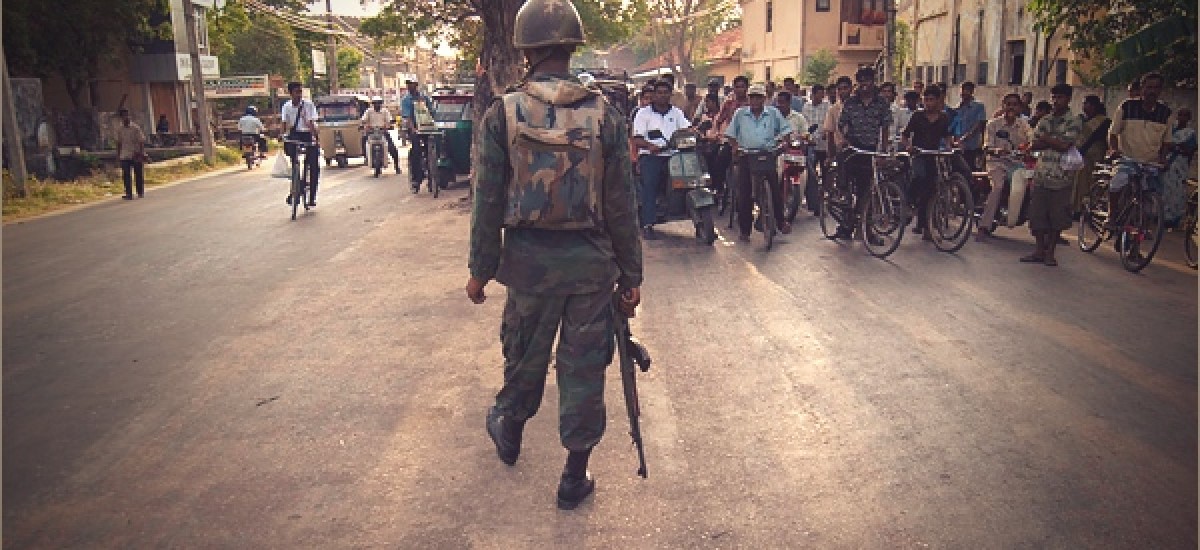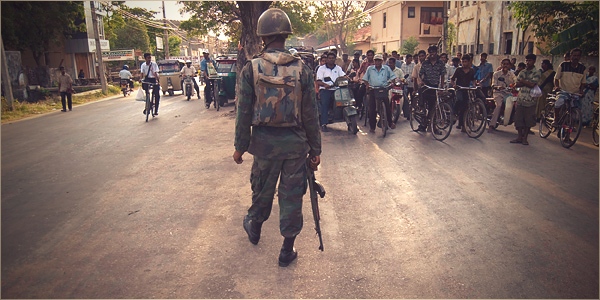Original image by J. Adam Huggins for The New York Times
Every mayoralty in Paris has tablets on which are inscribed the names of those from that locality who died in the many wars which France fought. Many are the works of art in the glorious buildings in Paris, which depict these battles, from Jeanne d’Arc (Joan of Arc) onward. Many are the military parades in remembrance.
This is so of most countries, not merely the hub of Enlightenment thinking. Russia recently celebrated with its parade in the Red Square, the victory over Nazi fascism. Thus we must be suspicious of the argument that Sri Lanka must not commemorate its victory over the terrorist separatist army of the LTTE. It is our legitimate entitlement which we must continue over the generations.
Is the war worth commemorating with celebration? The answer to that question resides in the answer to another: how many citizens of all ages are dying violently each week, compared to the average body count in the war years?
The cunning counter-argument is that the killing had stopped during the ceasefire (CFA). This is of course a blatant lie. Not only was our distinguished foreign minister Lakshman Kadirgamar killed during that period, so were a senior police officer inside a police station in Dehiwela, an Army colonel in Polhengoda, and 48 operatives of military intelligence – all with no price paid or penalties imposed on the Tigers by the government of the day or the so-called international community.
No less specious an argument is the one that contrasts the surgical character of the hit on Osama Bin Laden with the termination of the Tigers. The cold fact is that the Sri Lankan armed forces were surgically taking down the Tiger command structure with deep penetration LRRP operation, when the Prime Minister at the time (the present leader of the opposition) aborted the project by signing a lopsided ceasefire agreement, to the applause of the West. That surgical option aborted, the next time around, the endgame was bound to take an Old Testament character. As for the point that the dead Osama’s photographs were not shown, unlike those of Prabhakaran, the answer is that the irrational Al Qaeda swiftly admitted the death of its leader, therefore making photographic evidence unnecessary, while the pro-Tiger Tamil Diaspora demonstrated greater irrationality and delusion by refusing to admit the death of its leader, therefore rendering imperative the release of the photographs.
Another piece of propaganda masquerading as argument is that Sri Lanka merely liberated or reunified territory but more important is the people. Throughout world history, which is also the history of warfare, territorial control/recovery has been an objective in and of itself. Still more important is the primal existential urge to defend oneself from an enemy that is tormenting one’s collective, one’s community and to prevail over that enemy. This Sri Lanka has done. That alone makes the war a valid and legitimate one, and the victory worth celebrating. It is after all, the signal victory of our generation, on par with and possibly surpassing any contemporary ones anywhere in the world.
Post-War Debate
As a democracy let us by all means disagree, even vehemently, over the post war paths taken and not taken. Indeed the debates I have engaged in, in print, in the wake of the war, make interesting revisiting in the light of recent developments and prospects. These debates must not entail a rejection of the war and its legitimacy and a revalidation of the Tigers or those who prevaricated during the war. It remains a legitimate and valuable debate regarding the aftermath of a just war, a necessary war, and a victory which was grim but glorious.
This necessary debate on post-war policies must not be confused with or become a smokescreen for a de-legitimisation of our victory, for undermining it and rolling it back. The debate on the post war order is needed precisely for the consolidation of the military victory. The discussion must take into account the changed sub-regional, regional and international situation which constitutes our external strategic environment.
Where does the challenge to that victory come from and who drives it? Pre-eminently, the embittered element of the Tamil Diaspora. How is this Diaspora to be viewed? What should be its recognised role and how should it be regarded by host societies, mainly Western democracies, and the international community of states?
Fred Halliday (1946-2010), Professor Emeritus of International Relations at the London School of Economics and Research Professor at the University of Barcelona, published an essay on the website ‘Open Democracy’ entitled The World’s Twelve Worst Ideas, of which worst idea Number Three was that “Diasporas have a legitimate role to play in national and international politics”. He went onto explain his point saying that “the notion that emigrant or Diaspora communities have a special insight into the problems of their homeland, or a special moral or political status in regard to them, is wholly unfounded. Emigrant ethnic communities almost always play a negative, backward, at once hysterical and obstructive, role in resolving the conflicts of their countries of origin: Armenians and Turks, Jews and Arabs, various strands of Irish, are all prime examples on the inter-ethnic front, as are exiles in the United states in regard to resolving the problems of Cuba or policy-making on Iran.”
Especially sad is the phenomenon that some elements of the Sri Lankan polity and intelligentsia seem to take their cue from the Tamil Diaspora, reinforce its ‘hysterical’ (to use Halliday’s adjective) if not hallucinatory (Mahinda Rajapaksa as Adolf Hitler, Sri Lanka today as Nazi Germany) propaganda, and is indistinguishable from it.
Sovereignty
‘Unacknowledged ignorance’ is the most dangerous thing in the world, according to philosophers. The dominant discourse regarding Sri Lanka, both within and without the island, reveals precisely such unacknowledged ignorance. The polarised debate between human rights and national sovereignty is a major symptom of that ignorance. One side holds that human rights trump all, and that national sovereignty is a mere fig leaf for repression by the state. National sovereignty is seen as an ideology upheld by narrow minded ethnic or ethno-religious chauvinists. The other holds national sovereignty is sacrosanct and human rights subordinate. These elements define the nation in narrow ethno-religious terms. Not only are both sides wrong, they are also ignorant.
Few are aware that in the intellectual history of the Enlightenment, human rights and sovereignty – precisely national sovereignty—are inextricably, demonstrably intertwined. Few know or acknowledge that the landmark document on human rights, the Declaration of the Rights of Man and the Citizen, prepared and proposed by the Marquis de Lafayette and adopted by the National Constituent Assembly in Paris on August 26, 1789, as the first and most universalist and universalising fruit of the French Revolution, has as its third article, the following unambiguous pronouncement on sovereignty: “The principle of all sovereignty resides essentially in the nation. No body nor individual may exercise any authority which does not proceed directly from the nation”.
Irrespective of one’s opinion about this or that political leader, party or policy the defence of the historic gains of the war, as well as of democracy, requires the defence of the principle of national sovereignty.
A Luta Continua!
In the movie ‘Man on Fire’ Denzel Washington says with deliberate emphasis, spacing the words as he walks away through an underpass in Mexico City from a guy cuffed to an engine block of a car with a ticking time bomb beneath: “I wish you had the time”. I wish we had the time. With new developments in the politics of the sub-region, we need to extricate ourselves fast because the clock is ticking.
Today, danger is of external pressure building up to encirclement and siege. How best to resist it and roll it back? How to secure time and space for Sri Lanka? Lessons can be learnt from the experiences of states in similar or far more onerous circumstances in contemporary history.
For decades, Cuba has been under siege, economically blocked by its giant Northern neighbour. It has survived not only because it obtained the support of the USSR, but because notwithstanding the disappearance of the USSR, it earned the respect of and has built support and influence in its neighbouring region of Latin America.
When China felt threatened by the West it tilted to the USSR (Mao called it ‘leaning to one side’), and when it felt enveloped by both, it neutralised one front by allying with the West against the USSR. All the while it cultivated what Mao had called the intermediate zone of Third and Second world states.
Just a few years ago, Zimbabwe was in dire straits internationally. Today one hardly hears about it. The secret of Zimbabwe’s success is the buffering role played by its respected and influential neighbour, South Africa. Without that shield, Zimbabwe would have been wide open to its enemies.
Because of the unreasonable and escalating external pressure exerted upon us, today, two years after the war, the watchword of the African liberation movements fighting (Portuguese) colonialism springs to memory and suggests itself as apposite: A Luta Continua! The struggle continues!


